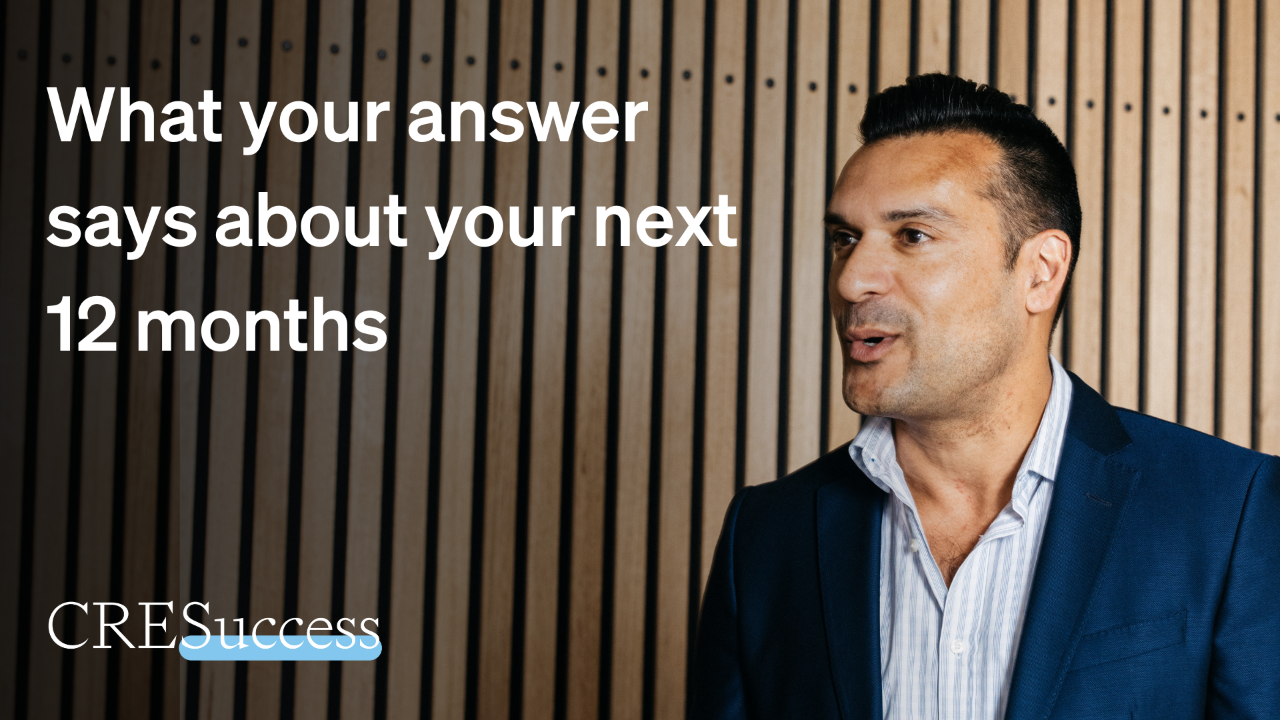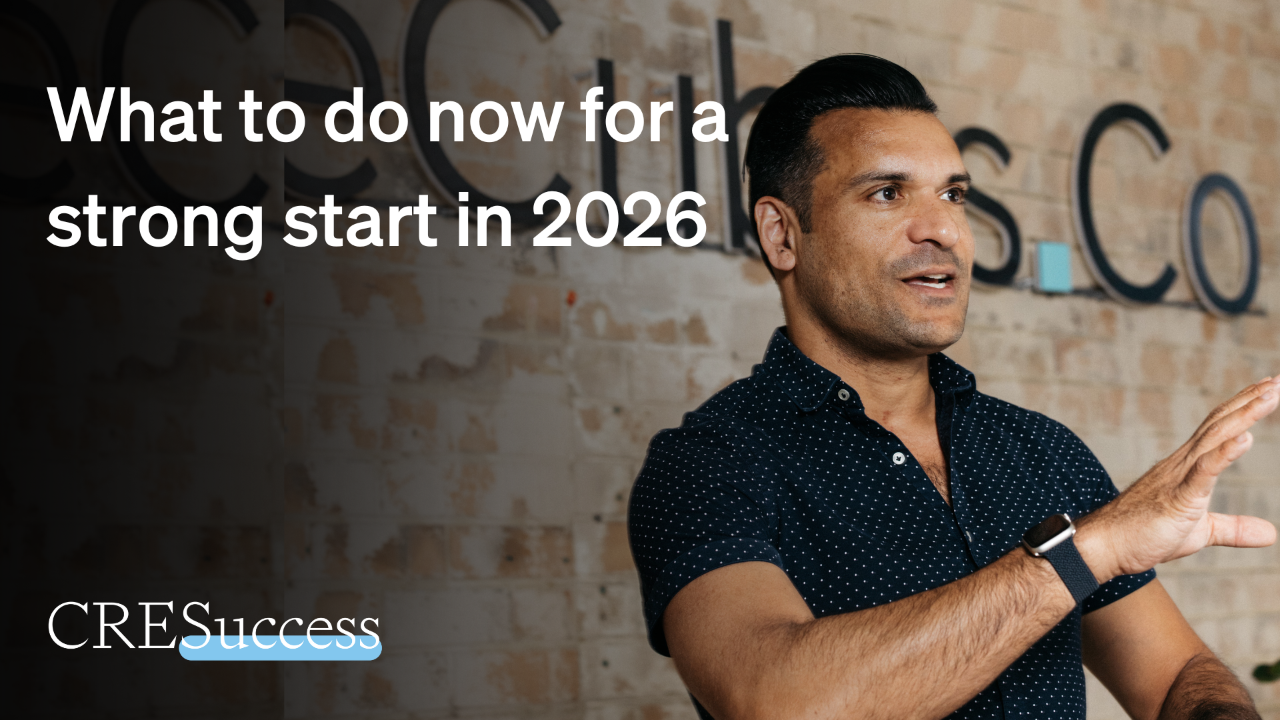Timing is important, but it’s just one of four things that really matter
Nov 09, 2022
I just got back to Melbourne from Cairns yesterday. It was my first time ever in Tropical North Queensland.
I was speaking at a conference, and I extended the trip so my family could come along for a short holiday.
The timing was great because the weather is beautiful there at this time of year, we were having new carpet installed in our home this week and my wife suffers from hay fever – which is at peak levels in Melbourne right now.
However, even if the timing wasn’t perfect, there were still many other reasons to feel grateful for being able to take this trip with them while delivering some work for a client at the same time.
You see, timing isn’t everything.
In fact, there are three other things that are just as important as timing when it comes to doing commercial real estate deals (and they all come before it in the acronym I have to share in this blog).
BANT is a basic framework for qualifying opportunities in business-to-business sales; it stands for budget, authority, need and timing.
Making sure you have BANT, or being able to create it, will save you a ton of time.
To find out how to look for it while you’re prospecting for clients, take a listen to episode 113 of CRE Success: The Podcast.
Episode transcript:
Do you consider yourself to be a sales professional or someone who leads a team of sales professionals?
If that's you, then I'm going to be talking about something which perhaps you don't know, but you should know, you must know.
If you want to make sure that you are having conversations with qualified prospects, who you actually have a real opportunity to deal with, if that sounds important to you, stick around.
Hello, welcome to episode 113 of CRE Success: The Podcast. My name is Darren Krakowiak. I help commercial real estate leaders to develop their people and to grow their business.
Really appreciate you being a listener of the show. And if anyone ever asks you, "Hey, what podcasts are you listening to right now?" Or if you're listening to us, and someone says, "Hey, what are you listening to right now with your headphones on?", make sure you tell them CRE Success: The Podcast so more people can find this content.
Probably more relevant to people who work in commercial real estate. But if you want to tell other people about it, be my guest. CRE Success: The Podcast is what you tell them that you're listening to right now.
So, I want to talk to you today about a concept which I think has importance for your efficiency.
It is relevant to the prospecting that you do. It's going to help you win more work because it's going to help you qualify the prospects that you're dealing with.
And also, I think it helps with your personal branding and leverage communications because it will help you understand who it is that you want to be talking to.
Now, you've probably heard the expression that timing is everything. But actually, timing isn't everything.
But I want to show that there are four things that we want to be looking out for when we are talking to prospects to make sure that they are qualified to be in a conversation with us and advance through to the next stage.
And the four things are represented by the word BANT.
And what we're looking for when we're prospecting is a BUDGET. We're also looking for AUTHORITY. We want to recognize if they have a NEED or not, and also understand the TIMING.
What I want to do in today's episode is help you understand what BANT is, how you can identify it and how you can create it perhaps if it doesn't exist.
Just because BANT doesn't exist with a prospect, that doesn't mean that you're at a dead end. There are other things that you can do.
So, BANT is one way to analyze and qualify opportunities through the discovery process. It's a fairly rudimentary and simple tool.
There are more complicated ways that you can qualify prospects. But this is a simple one that's been around for a while. That's easy to remember, so that's why I'm talking about it to you today.
And I do think it's something that all sales people should know. But I think that there are people in commercial real estate who, perhaps, are doing this, without realizing, and I think by systemising the bad process, you can get to an answer of whether you're speaking to the right person or not more quickly.
So the four elements, as I said, are Budget, Authority, Need and Time.
First up is Budget. And generally, if you're listing commercial real estate for sale, if you're speaking to the owner, they could probably afford to use your service.
But it's not only just about if they can't afford it, it's if they have the budget to spend, if they are willing to pay your fee, or if you can convince them to pay your fee.
And there might be other spending that comes into the picture that perhaps they need to be convinced.
The most obvious one I can think of right now is marketing.
And if you require your vendors to spend a certain amount of marketing in order for a campaign to gain traction and to be worth your while to spend time on, then that's part of the qualification process - recognizing if they are able to spend that money that you require them to spend to help you to market the property.
So the first area that we want to understand is the Budget. That's the B out of the word BANT.
Next up is the word Authority. And you might think, "Yeah, well, I'm speaking to the right person because they're the owner."
But sometimes we're not speaking to the owner. Or, sometimes we're speaking to the person who maybe is one of the owners or says they are the owner, but they're not really the owner.
Quick title search can often tell us if we are speaking to the owner or not. Other times they can be someone who's very influential on the decision.
So, we want to understand who is the decision maker or the decision makers. And make sure that we are speaking to the person or that we have access to the person who's ultimately responsible for making the decision.
Next up is Need. And I think we really want to understand what the needs are of our prospects.
That helps us to provide a solution which is more relevant for them. Because if they don't have a need to be using our service, then they're probably not likely to take action and proceed.
Or, if we don't identify what the correct need is, we can't put forward a compelling solution that's going to make it more likely that they're going to select us.
So, we want to understand what are the immediate needs of this prospect? And do they have any burning questions or urgent problems that need to be solved?
This helps us understand their motivations, and to ultimately move the deal forward more quickly. Because I think it's not only about our ability to convert deals, but it's also about our ability to progress them through the various stages of our funnel and our pipeline.
Lastly, is Time. Time is the last one. And we just want to know when this is going to happen?
I guess everyone's eventually going to sell. Everyone's eventually going to make a decision.
But we need to understand if they have motivation and intent in order to do something within a timeframe that makes us appropriate for us to be spending the amount of time that we want to spend with a prospect that's likely to turn into a listing a deal, and ultimately into revenue.
So Budget, Authority, Need and Time.
This is not a commercial real estate concept. It's something which can be used, I think, in any sale. And in any sale, we want to make sure that BANT exists in order for us to get the deal done.
However, BANT doesn't need to exist in order for us to be able to do a deal. Or at least, it doesn't need to exist in the first instance, because we can create it, and we can look for ways to create it.
For example, the Budget. If someone isn't convinced on spending money on marketing, or paying the fee that we require, then that's something that we need to create, and we need to work on in order to get them over the line.
If there isn't any timeline, then we need to try and work with the prospect to create some rigor around when it is that they want to do something.
And that can be through the opportunity that exists in the marketplace that perhaps we present them with as we're going through the conversations that we're having with them in order to help them to realize the opportunity that we see for their property if we're doing a sale in the marketplace.
Now, Authority is an interesting one. Because if the person you are speaking to doesn't have BANT, or if they specifically don't have the Authority, then you may want to speak to somebody who does. And I think you probably will need to in order to progress.
But, I think we still always want to respect the initial point of contact's role in the process.
So, what I mean by that is, just because they don't have the authority, for example, it doesn't mean that they don't have any influence over the process.
And that person who you're initially speaking to who perhaps isn't the right person who can provide with all the elements of BANT, they can still provide you with information, which can help you inform your discussions with the person who was able to get you to the B, the A, the N and the T within BANT.
We want to be respectful of everyone's role in the process. We want to understand that, in a lot of cases there is more than one person who is influential, even if there is ultimately one person who is the decision maker or who has the authority to move forward.
So, I mentioned before about efficiency, prospecting, ways to win and also personal branding. I think the more that we understand the elements of BANT, the more that we can start talking to people who are likely to possess that through our leverage communications.
That helps us identify prospects. If we are speaking to prospects who are more qualified, that means it's going to help us move opportunities through our pipeline faster, including through personal branding, social media posts, but also in terms of efficiency and effectiveness, we can ask questions at scale through EDMs.
And ultimately, of course, if prospects are more qualified, then we're more likely to have a higher win rate.
These are all the important elements of having more success in commercial real estate if your goal is ultimately to drive more revenue.
So a simple episode for you today about BANT. Remember its Budget, Authority, Need and Time.
We do cover within CRE Success: Membership a lot of these types of concepts for our members.
Each and every month we get together on the 2nd Tuesday of each month.
And we do a 1-hour workshop, where we present some concepts in more detail that help you in the areas of efficiency and effectiveness, like I've mentioned, help you grow your personal brand, help you identify more prospects, turn those prospects into opportunities that you're able to win.
And ultimately, then grow your relationship with clients through things like repeat business, referrals, testimonials, etc.
If you'd like to join us inside the community, we're going to be opening up really soon.
Go to cresuccess.co/membership and just leave your details and you'll be the first to know about when we reopen CRE Success: Membership to our next cohort of new members. That's cresuccess.co/membership.
That's our episode for today. Thank you so much for listening and I will speak to you soon.








